News and Announcements
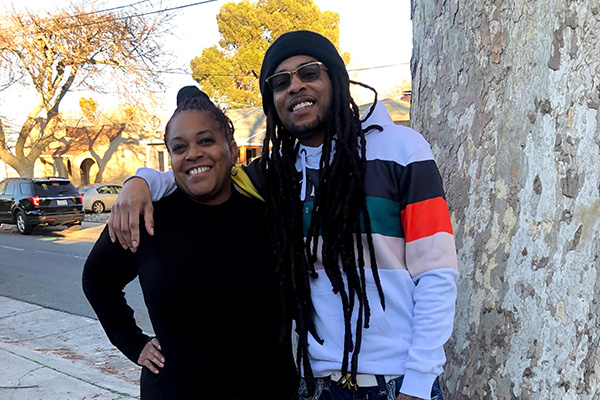
An SF State student who has passed down her love of literature and language to her children is now paying it forward to the next generation. Theresa Thompson recently established her own nonprofit organization in honor of her late son, Marcus Angelo Bryant, while entering SF State last year in her late 50s.
We Theresa’s Kids is a nonprofit promoting literary excellence in middle and high school-age children from underserved areas by teaching them to read, write and understand poetry. The nonprofit provides free classes at public libraries throughout the Bay Area.
“Our hope is that they seek higher learning, so we want to show them that the library is their sanctuary,” said Thompson, a Creative Writing major and Education minor. Her goal is to become a middle-school teacher in the Oakland Unified School District.
“Young people struggle in middle school, and I want them to know that someone cares,” she said. “I want them to know that school is a safe place — that you can pour your emotions out on paper, and I won’t judge you.”
At SFSU, Thompson has landed a work-study position with the Marian Wright Edelman Institute, which promotes early literacy in underserved areas of San Francisco.
“It has taught me so much about working with young people,” she said. “It’s preparing me for what’s to come. These are all pivotable moments that I’m experiencing at San Francisco State.”
Thompson keeps a home full of books, sharing her lifelong love for reading and vocabulary in her five children (and, now, nine grandchildren). Bryant was not only an avid reader, but also taught himself Swahili and three dialects of Spanish. He was planning to enter community college before his death in 2023.
“Marcus was the joy of the family, the one who made everyone laugh,” Thompson said. “He was very proud of his home life.”
Bryant was also an organ donor. Shortly after his memorial service, Thompson wrote poems and a class paper about his sacrifices and channeling her pain, and is writing a fantasy-fiction short story titled “The Sword of Seraphims: The Marcus Angelo Chronicles.” She is now an ambassador for Donor Network West, the organ procurement organization for Northern California and Northern Nevada.
“I refuse to allow my grief to make me a slave, so I’m going to repurpose my pain and turn it into something else,” she said. “And Marcus repurposed himself. He lost his life, but he saved five lives. And the one thing I’ll never forget is that his heart and one of his lungs went to the same person.”
Learn more about the Creative Writing Department.
Photo courtesy of Theresa Thompson
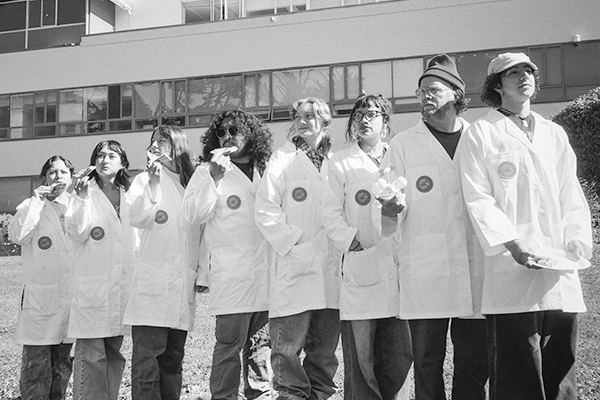
In these extraordinary times, we can learn something by stepping back and exploring the ordinary. At SF State, about 100 students led by an artist-in-residence have investigated the everyday, creating new works of art in a “fake” department called The Office for the Study of the Ordinary.
A culminating exhibition in the SFSU Fine Arts Gallery showcases the processes, artifacts and printed material compiled over the past year by 150 overall participants. “Objects of Inquiry: The Office for the Study of the Ordinary” is on display Saturday, Feb. 22 – Saturday, April 5. Admission is free.
“Bureaucracy and art seemingly wouldn’t mesh. Put them together and something weird comes out,” said Liz Hernández, the Harker Artist-in-Residence at SFSU, a position made possible by the Harker Fund at the San Francisco Foundation. “The ordinary can be extraordinary if you shift your focus.”
Hernández worked alongside students in their classes for one to two weeks at a time to create collaborative art projects. Supplied with lab coats, magnifying glasses and measuring tape, students strolled the campus and took pictures of their observations. They created ID cards with fictional job titles for themselves: fantastical daydreamer, termite enthusiast, dust collector and so on.
Student Nanako Nirei has contributed an acrylic drawing for a large-scale comic about SFSU’s mascot, depicted as a fictional character named Al the Gator. Nirei is enrolled in the ART 619 “Exhibition Design” course that is responsible for installing and promoting “Objects of Inquiry.”
“This is the first time I’ve been part of a big show,” she said. “I’m honored being in it and helping put everything up.”
Upon entry to “Objects of Inquiry,” visitors are greeted at a reception desk assembled with old furniture from campus storage. They are then led on a self-guided tour highlighted by a false tale involving student protests against inhumane treatment of an alligator housed on the SFSU campus. (For the record, this never actually happened; fakeness and subversion are hallmarks of Hernández’s art). Hernández created a life-sized sculpture of an alligator with angel wings, laying on a stretcher.
“I wanted to show the legacy of student-led protests at SF State. I was surprised that so many students didn’t know about it,” Hernández said. “I like to tell stories to the world through fiction in a way that doesn’t damage anyone, but gets you to think.”
Collaborating with students has been the most rewarding part of Hernández’s residency, she says: “I’ve learned so much from the students. There are small moments of tenderness and vulnerability. I’d never expect students to open up that way.”
An opening reception for “Objects of Inquiry” will be held Feb. 22, 1 – 3 p.m. Regular hours for the Fine Arts Gallery are Tuesdays – Fridays, noon – 4 p.m.
Learn more about the SFSU School of Art.
Photo by Liz Hernández
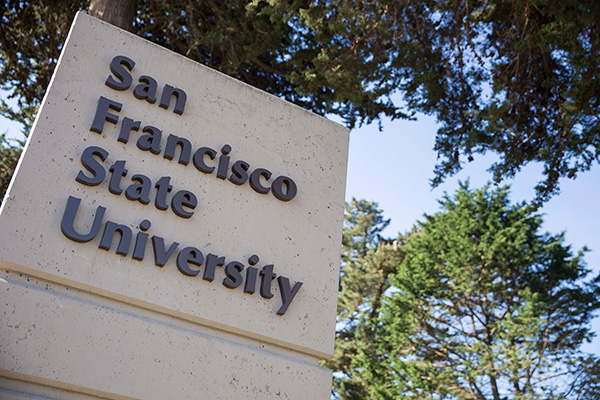
Nominations for the 2025 distinguished faculty and staff awards are now open. These awards are an opportunity for SFSU to recognize and honor outstanding tenured faculty, full-time lecturers and staff who have demonstrated significant, long-term contributions to the University and to their disciplines.
By recognizing the achievements of distinguished faculty in the areas of teaching, professional achievement and growth, and service (faculty and staff), the campus community celebrates the University’s excellence. The San Francisco State University Foundation sponsors the awards.
Please submit nominations via Qualtrics by 5 p.m. on Monday, March 24.
For questions, please contact members of the awards committee.
The nomination period for the spring 2025 Staff Council elections is now open. The Staff Council encourages staff members to consider nominating themselves or a colleague.
The nomination period concludes Friday, March 7. The voting period is Monday, March 17 – Friday, April 4.
Vacancies are in: unit 1, unit 2, unit 4, unit 5, unit 8, unit 9-GTS and unit 9-Tech service.
Please submit nominations via Qualtrics.
For questions, please email the Staff Council at askstaffcouncil@sfsu.edu.
Explore SF State is the University’s signature spring event for admitted students and their families — a day for them to visit campus, make connections and learn about life as a Gator. You can help them feel that they’ve found their home at SF State by serving as a volunteer ambassador.
Explore SF State will take place Saturday, April 5. Ambassador shifts are 7 a.m. – 2:30 p.m. Lunch will be provided for all who help for the day.
Calling all hands! SF State’s 124th Commencement ceremony will be Friday, May 23, at Oracle Park, home of the San Francisco Giants. The campus community is encouraged to participate and help make this a special event for graduating students, their friends and family members. Assignments will be 1:30 p.m. – 9:30 p.m.
As in years past, all ambassadors are asked to receive approval from their supervisor and attend an informational training via Zoom in late May for their assignment.
Many assignments involve large amounts of walking and standing. To request accommodations, please note them on the signup form under “Questions or requests.” For questions, please email Dania Russell at drussell@sfsu.edu.
SF State’s 124th Commencement ceremony will be Friday, May 23, at Oracle Park in San Francisco. To make this event even more memorable for graduates and their families, faculty members are encouraged to serve as faculty marshals. Assignments will be 1:30 p.m. – 9:30 p.m.
As in years past, all faculty marshals are asked to attend an informational training in late May via Zoom for their assignment.
Many assignments involve large amounts of walking and standing. To request accommodations, please note them on the sign-up form under “Questions or requests.” For questions, please email Ken Maeshiro at kmaeshir@sfsu.edu.
Zoom AI Companion 2.0 is now available to all campus users, bringing a complete overhaul and expansion of artificial intelligence (AI) offerings to the Zoom platform. New features include a built-in generative AI text chat tool, enhancements to AI capabilities within meetings, and an integration into the Zoom Docs features for AI-assisted document creation and summaries.
Please visit the Academic Technology website to get started and learn more.
Faculty Affairs and Professional Development has an open position for associate dean of Faculty Affairs and Professional Development. The associate dean will assist the associate provost in all faculty-related processes and have significant responsibilities in the development and implementation of all new and continuing priorities and initiatives.
Application review begins Saturday, March 15, and will continue until the position is filled. The start date is negotiable but is anticipated between Tuesday, July 1, and Monday, Aug. 4. The associate dean reports to the associate provost for Faculty Affairs and Professional Development.
Please visit the Human Resources website to view position details and application information.
The SF State Academic Senate met on Tuesday, Feb. 18, via Zoom (Please via the agenda via Box).
The Senate:
- Elected Executive Committee at-large member:
- Frederick Green, professor/chair, Modern Languages and Literatures
- Passed by general consent the following items:
- Minor in Persian Studies (MN-PRSN): reduction in units
- Bachelor of Arts in History (BA-HIST): distance education authorization
- Graduate Certificate in Learning Experience Design and Online Teaching Innovation (CT-TSD): distance education authorization
- Passed the following items:
- Bachelor of Science in Hospitality, Tourism and Event Management (BS-HTM): name change
- Bachelor in Music: Concentration in Music Production (BM-MUSMP): degree type change
- International Relations Graduate Pathway Program (IRGPP-SELF): new certificate proposal
- Minor in Business Analytics: new minor proposal
- Master of Science in Accountancy (MS-ACCT): change designation, change core classes
- Bachelor of Arts in Early Childhood Studies: Concentration in PK – 3 Integrated Teacher Education Program, concentrations
- Bachelor of Arts in Early Childhood Studies: Concentration in Special Education Integrated Teacher Education Program (ITEP), concentrations
- Bachelor of Arts in Early Childhood Studies, concentration in Care and Education: concentrations
- Bachelor of Arts in Early Childhood Studies, concentration in Pre – K to Third Grade: concentrations
- Revision to Policy on Program Sustainability, Continuance and Discontinuance #F24-177
- Heard in first reading the following item:
- Teaching English to Speakers of Other Languages Graduate Pathway Program (TESOLGPP-SELF): new certificate
- Heard presentations from:
- Nancy Gerber, Baccalaureate Requirement Committee chair and Kent Lorenz, general education (GE) faculty director: “GE 2025”
- Rob Collins and Dipendra Sinha, Academic Senate of the California State University (ASCSU) senators: “ASCSU Update”
For questions or concerns about the items heard in first reading, please email Campus Curriculum Committee Chair Rick Harvey at rharvey@sfsu.edu.
The Center for Equity and Excellence in Teaching and Learning, Academic Technology and J. Paul Leonard Library present a workshop on Open Educational Resources (OER) on Tuesday, Feb. 25, noon – 1 p.m., in Library 242 and via Zoom.
Learn the basics of using OER to save students money and support teaching and learning. OER can encompass a variety of materials, including syllabi, lesson plans, learning modules, lab experiments, simulations, course videos, discussion prompts, assignments, assessments, library guides and course design templates. CSU faculty who adopt OER and other low- or no-cost course materials are eligible to apply for an Affordable Instructional Materials Initiative grant.
The Raza Faculty and Staff Association (RFSA) invites the campus community to its spring kickoff event on Wednesday, Feb. 26, 8:30 – 10 a.m., at the University Club in the Cesar Chavez Student Center. Cafe y pan (coffee and pastries) will be served.
RFSA encourages new faculty and staff to attend, join and learn about open positions for faculty co-chair, communications director and archivist.
For more information, please email rfsa@sfsu.edu.
Are you from an academic department and want to engage your alumni more effectively? Learn how SF State affinity groups and regional chapters can support your efforts on Wednesday, Feb. 26, at 11 a.m. via Zoom. It includes a presentation followed by Q&A.
The “Collaboration with Zoom AI Companion” course introduces participants to the Zoom AI Companion and its practical applications within a university setting. It will be held Wednesday, Feb. 26, 11 a.m. – 12:30 p.m., via Zoom.
The course covers key features such as meeting summaries, real-time Q&A, interactive smart recordings and whiteboard tools for generating sticky notes, tables, mind maps and flowcharts. Participants will learn how to apply these tools to enhance productivity, collaboration and learning in academic and administrative contexts through guided demonstrations and hands-on activities.
This course is an elective that counts toward receiving a digital badge for the AI Literacy Education Program.
Join Political Science faculty for a webinar offering sober analysis of the first month of President Trump’s second term in office on Wednesday, Feb. 26, 11 a.m. – 12:30 p.m., via Zoom. The discussion will focus on government checks and balances, legality, constitutionality and domestic impacts. Panelists include Nick Conway, Rebecca Eissler, Amy Hammond, Mark Leinauer, Jason McDaniel, Amanda Roberti and others.
Are you stressed and exhausted? Do you experience neck and shoulder pain? Does your mind never stop? Attend the Holistic Health workshop series to learn skills to enhance health. Sonja Riket will lead “Mindful Movement Meditation,” based on Feldenkrais and body-mind centering, on Wednesday, Feb. 26, and Wednesday, March 6, noon to 1 p.m., in HSS 306.
The events are open to the University community and sponsored by the Institute for Holistic Health Studies and the Department of Recreation, Parks and Tourism.
The “Generative AI for Visual Design” course offers an exploration of visual generative artificial intelligence (GenAI) tools for image and design generation. It will be held Thursday, Feb. 27, 2 – 3:30 p.m., via Zoom.
Participants will gain a primer on visual GenAI tools, considerations for using GenAI and some best practices for creating effective and accessible designs. Through hands-on activities, participants will develop skills in crafting descriptive prompts and selecting appropriate visual styles to generate unique images using Adobe Firefly. They will also learn how to generate visual elements to be incorporated into designs using Adobe Express.
This course is an elective that counts toward receiving a digital badge for the AI Literacy Education Program.
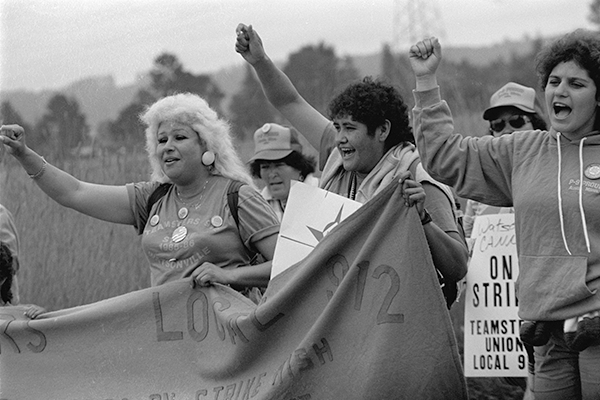
The campus community is invited to join the opening of “The Stubborn 1,000: The Watsonville Canneries Strike,” on Thursday, Feb. 27, 4 – 6:30 p.m., in the Special Collections Gallery on the fourth floor of J. Paul Leonard Library. This is a Labor Archives and Research Center exhibition.
This event includes an exhibition tour at 4:30 p.m. with co-curator and Associate Librarian Tanya Hollis.
Watsonville, in the heart of the agricultural Pajaro Valley, was once known as the “frozen-food capital of the world” with a large number of canneries processing the majority of frozen-food products sold in the United States. In September 1985, nearly half of the town’s 4,000 cannery workers went on strike to protest reductions in wages and benefits at the Watsonville Canning and Shaw Frozen Food Companies.
Curated by Hollis and Cabrillo College Instruction Librarian Michelle Morton and drawing upon the collections from the Labor Archives and Research Center, “The Stubborn 1,000” tells the story of this historic strike. Led predominantly by Mexican and Mexican American women, the strikers went up against the cannery owners, the powerful agribusiness machine, local police and their own union, which had become entrenched and unresponsive. After battling for 18 months, strikers rejected an initial settlement negotiated by the union, pushing back against larger pay cuts and winning medical benefits for all workers, seniority rights and striker amnesty. But most of all, they gained organizing and leadership skills and a voice in the future of their community.
As striker Margarita Páramo explained: “We knew we had won, and we began to feel that we had won more than the strike; ganamos dignidad y un futuro bueno para nuestros hijos (we won dignity and a good future for our children).”
This exhibition was generously funded by the Friends of the J. Paul Leonard Library.
A Canvas module, created in partnership with Cabrillo College, is available for faculty to use with the exhibition.
Photo: “Watsonville Strikers Holding a Banner.” Courtesy of the Unity Archive Project.
The Lam-Larsen Initiative for Emerging Technologies hosts “Discover the Power of Comics in Case Writing” on Friday, Feb. 28, at noon via Zoom. The event is open to students, faculty, staff and alumni. This workshop is designed for educators across disciplines who are passionate about making learning more accessible, inclusive and impactful.
This webinar will feature Yasser Rahrovani, associate professor of Information Systems at the Ivey School of Business, University of Western Ontario. Rahrovani will introduce an approach to teaching sensitive topics using comics and visual stories and share how comics can be used as a powerful tool to address sensitive topics such as sexual harassment and artificial-intellgience bias in educational settings. This approach aligns with diversity, equity and inclusion principles by fostering a more inclusive, engaging and learner-centric environment.
Participants will gain practical insights into:
- When and how to use comics as an instructional tool
- Effective pedagogical techniques for teaching with comics
- A critical comparison of comic-based cases versus traditional text-based cases
- The process of creating compelling comic cases
Every day, Bay Area youth face and overcome structural barriers to their wellbeing. Racism, marginalization, criminalization and various forms of oppression are too often common features of young people’s lives. “Youth Justice Now! Youth Justice How?” brings together individuals whose lived and professional experience can shed light on the struggles and successes involved with striving for transformative youth justice in the Bay Area and beyond. This event will be held Thursday, March 6, 11:30 a.m. – 1:45 p.m., in HSS 204.
Organized by the Department of Criminal Justice Studies, Project Rebound, Fresh Lifelines for Youth and Larkin Street Youth Services, this community-building event aims to be conversational, educational and empowering.
Please RSVP via Qualtrics (RSVP required).
For more information, please email Albert de la Tierra.
Ramadan is fast approaching. The Muslim holy month is expected to begin Friday, Feb. 28, and continue through Sunday, March 30. Muslim Student Life invites the campus community to its iftars (communal dinners) during Ramadan on Thursday, March 6; Thursday, March 13; and Tuesday, March 18, at 6 p.m. at the University Club, Cesar Chavez Student Center.
Please RSVP via Luma (RSVP required).
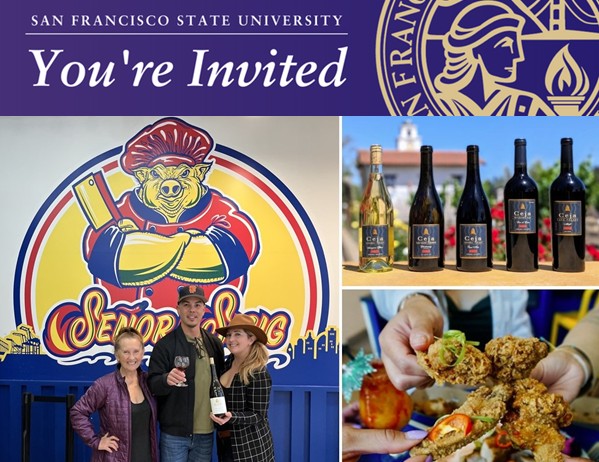
Mark your calendars for Thursday, April 17, when the Alumni Association gets together for a pairing of outstanding wines from Ceja Vineyards with the flavors of Señor Sisig. The pairing will be hosted by Alumni Hall of Famers Evan Kidera of Señor Sisig and Dalia Ceja of Ceja Vineyards will serve as hosts, along with longtime SFSU supporter Amelia Ceja of Ceja Vineyards.
The event will be held 6 – 8 p.m. at Señor Sisig at 330 17th St. in Oakland.
Please purchase tickets via the Alumni Association website.
For questions and comments, please email Ken Maeshiro.
Photos, clockwise from left: Amelia Ceja, Evan Kidera and Dalia Ceja by Ken Maeshiro; Ceja wine bottles courtesy of Ceja Vineyards; and Señor Sisig chicken wings courtesy of Señor Sisig.
SF State Spotlight
Creative Writing Professor May-lee Chai reviewed the newly translated Tunisian feminist novel, “A Calamity of Nobel Houses” by Amira Ghenim, for The New York Times Book Review, digital and print editions, on Jan. 14.
The historical novel is inspired by the life of an early 20th-century scholar, feminist writer and labor activist, Tahar Haddad, by imagining a love story between Haddad and a brilliant student, a young woman, Zbaida Rassaa, who is forced to marry into a conservative family who frown upon her education. The multigenerational novel shows Tunisia’s history and the tensions caused by classism, racism, homophobia, antisemitism, misogyny and the lingering aftereffects of colonialism.
Chai writes: “‘A Calamity of Nobel Houses’ is not just a fictionalized version of his [Haddad’s] life, but a kaleidoscopic portrait of Tunisian history, from colonial rule to the Nazi occupation to the country’s independence and the political struggles that followed.”
Professor of Communication Studies Christopher Koenig and longtime collaborator, University of San Francisco Communication Studies Professor Evelyn Ho, published a new conceptual model of health equity in the international journal Patient Education and Counseling.
Their article adapts an established model that theoretically proposes the relationship between communication and a range of health outcomes. Koenig and Ho use two previously published examples in which clients raise use of Complementary and Integrative Medicine (CIM) to illustrate how CIM communication involves the role of social interaction and the relationship to health equity more generally. The main contribution of this article refocuses health outcomes as a product of the moment-by-moment flow of social interaction between clinicians and their clients.
Assistant Professor of Africana Studies Tiffany Caesar appeared on KQED-FM’s “Forum” on Feb. 19 week to discuss Black History Month.
“We at San Francisco State University pride ourselves on truth. We pride ourselves on inclusivity and diversity,” she said.
Recreation, Parks, Tourism and Holistic Health Professor Erik Peper gave an invited Zoom presentation, “The Mind/Body/Spirit Bridge: Elevate Your Practice through Breathwork Strategies,” for a meeting of the Therapeutic Touch Networks of Canada on Feb. 15.
On Feb. 15, Peper contributed a blog post to Townsend Letter, titled “Conflict to Calm: Reframing Stress and Finding Peace with Difficult People.”